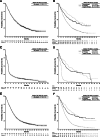Retrospective analysis of real-world treatment patterns and clinical outcomes in patients with advanced non-small cell lung cancer starting first-line systemic therapy in the United Kingdom
- PMID: 33962574
- PMCID: PMC8106229
- DOI: 10.1186/s12885-021-08096-w
Retrospective analysis of real-world treatment patterns and clinical outcomes in patients with advanced non-small cell lung cancer starting first-line systemic therapy in the United Kingdom
Abstract
Background: The treatment landscape for advanced non-small cell lung cancer (aNSCLC) has evolved rapidly since immuno-oncology (IO) therapies were introduced. This study used recent data to assess real-world treatment patterns and clinical outcomes in aNSCLC in the United Kingdom.
Methods: Electronic prescribing records of treatment-naive patients starting first-line (1 L) treatment for aNSCLC between June 2016 and March 2018 (follow-up until December 2018) in the United Kingdom were assessed retrospectively. Patient characteristics and treatment patterns were analyzed descriptively. Outcomes assessed included overall survival (OS), time to treatment discontinuation, time to next treatment, and real-world tumor response.
Results: In all, 1003 patients were evaluated (median age, 68 years [range, 28-93 years]; 53.9% male). Use of 1 L IO monotherapy (0-25.9%) and targeted therapy (11.8-15.9%) increased during the study period, but chemotherapy remained the most common 1 L treatment at all time points (88.2-58.2%). Median OS was 9.5 months (95% CI, 8.8-10.7 months) for all patients, 8.1 months (95% CI, 7.4-8.9 months) with chemotherapy, 14.0 months (95% CI, 10.7-20.6 months) with IO monotherapy, and 20.2 months (95% CI, 16.0-30.5 months) with targeted therapy. In the 28.6% of patients who received second-line treatment, IO monotherapy was the most common drug class (used in 51.6%).
Conclusions: Although use of 1 L IO monotherapy for aNSCLC increased in the United Kingdom during the study period, most patients received 1 L chemotherapy. An OS benefit for first-line IO monotherapy vs chemotherapy was observed but was numerically smaller than that reported in clinical trials. Targeted therapy was associated with the longest OS, highlighting the need for improved treatment options for tumors lacking targetable mutations.
Keywords: Advanced or metastatic non-small cell lung cancer; Real-world outcomes; Real-world treatment patterns.
Conflict of interest statement
JL has received honoraria and sponsorship from and participated in advisory boards for Roche, AstraZeneca, Pfizer, Boehringer Ingelheim, MSD, Bristol-Myers Squibb, and Lilly. CE has received travel grants from MSD, Roche, AstraZeneca, and Boehringer Ingelheim; consultancy fees from MSD, AstraZeneca, and Boehringer Ingelheim; and lecturer fees from Pfizer, AstraZeneca, and Roche. EH has participated in advisory board work for Roche, Tesaro, and GSK. TM has associations with MSD, Bristol-Myers Squibb, AstraZeneca, Roche, Boehringer Ingelheim, PharmaMar, and Tesaro. AC received an educational grant from Servier. SC has received speaker’s fees from Bristol-Myers Squibb. CP has received sponsorship to conferences from Boehringer Ingelheim and Roche and honoraria for talks and session chairing from Boehringer Ingelheim and Bristol-Myers Squibb. X Zhuo was an employee of EMD Serono Research & Development Institute, Inc., Billerica, MA, USA, an affiliate of Merck KGaA, Darmstadt, Germany, when the analysis was conducted and is now an employee of Bristol-Myers Squibb. AD was an employee of Merck Serono Ltd., Feltham, United Kingdom, an affiliate of Merck KGaA, Darmstadt, Germany, when the analysis was conducted and is now an employee of Novartis. AA, PM, X Zhang, and VP are current employees of Merck KGaA, Darmstadt, Germany. SK, JB, JC, LN, and VN have no relationships to disclose.
Figures


References
-
- Royal College of Physicians. National Lung Cancer Audit annual report 2016 (for the audit period 2015). Available at: https://www.rcplondon.ac.uk/projects/outputs/nlca-annual-report-2016. Accessed 4 May 2020.
-
- Cancer Research UK. Types of lung cancer. Available at: https://www.cancerresearchuk.org/about-cancer/lung-cancer/stages-types-g.... Accessed 4 May 2020.
-
- Postmus PE, Kerr KM, Oudkerk M, Senan S, Waller DA, Vansteenkiste J, Escriu C, Peters S. Early and locally advanced non-small-cell lung cancer (NSCLC): ESMO Clinical Practice Guidelines for diagnosis, treatment and follow-up. Ann Oncol. 2017;28(suppl_4):iv1–iv21. doi: 10.1093/annonc/mdx222. - DOI - PubMed
Publication types
MeSH terms
Substances
LinkOut - more resources
Full Text Sources
Other Literature Sources
Medical
Research Materials

